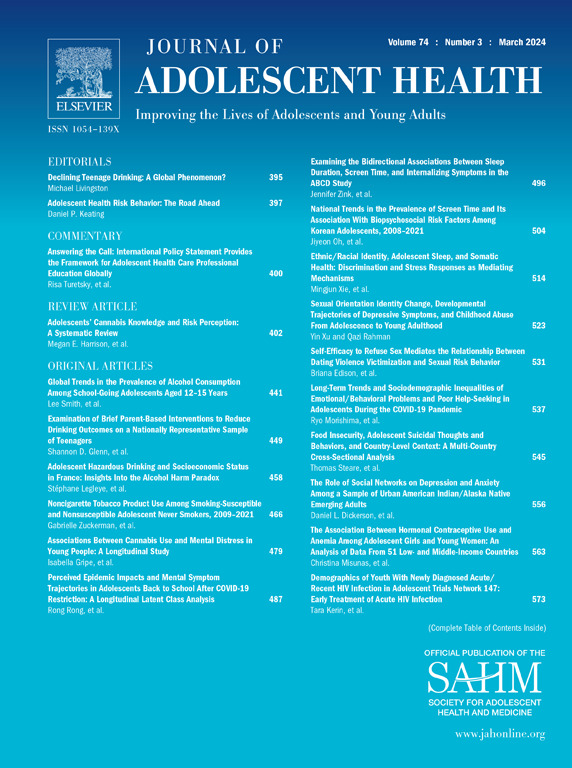支持确认自己性别的澳大利亚跨性别年轻人的心理健康和福祉结果。
IF 4.5
2区 医学
Q1 PEDIATRICS
引用次数: 0
摘要
目的:年轻的跨性别者面临着较高的心理健康和幸福状况不佳的比率。以对他们有意义的方式确认他们的性别对这些结果具有重要意义。然而,有限的研究调查了感觉支持在确认其性别方面的作用。方法:本研究使用了1697名跨性别青年的数据,这些数据来自澳大利亚LGBTQA+ 14-21岁的大型调查。回归分析检查了那些表达了这样做的愿望的人在医学、法律或社会上支持确认性别的感觉如何与心理健康和福祉结果相关联。结果:在过去的12个月里,那些在医学上、法律上或社会上得到支持以确认自己性别的参与者报告说,自杀意念和自残较少,心理困扰、焦虑和幸福感也较低。在过去的12个月里,对医疗和法律确认的支持与较少的自杀企图有关。在过去的12个月里,支持每一种形式的性别肯定与经历基于偏见的言语骚扰和性骚扰的几率较低有关,支持法律和社会肯定与经历基于偏见的身体骚扰的几率较低有关。支持每一种形式的性别肯定与经历无家可归的几率较低有关。讨论:支持跨性别青年以对他们有意义的方式确认自己的性别是他们健康和幸福的关键。必须鼓励那些有能力支持年轻跨性别者确认自己性别的人,并让他们有能力这样做。本文章由计算机程序翻译,如有差异,请以英文原文为准。
Mental Health and Wellbeing Outcomes Among Trans Young People in Australia Who Are Supported to Affirm Their Gender
Purpose
Young trans people face elevated rates of poor mental health and well-being outcomes. Affirming their gender in ways that are meaningful to them has important implications for these outcomes. However, limited research has examined the role of feeling supported to affirm their gender.
Methods
This study used the data of 1,697 trans youth drawn from a large survey of LGBTQA+ 14–21-year-olds in Australia. Regression analyses examined how feeling supported to affirm gender medically, legally, or socially, among those who expressed a desire to do so, was associated with mental health and well-being outcomes.
Results
Participants who felt supported to affirm their gender medically, legally, or socially, reported less suicidal ideation and self-harm in the past 12 months as well as lower psychological distress, lower anxiety, and greater happiness. Support for medical and legal affirmation was associated with less suicide attempt in the past 12 months. Support for each form of gender affirmation was associated with lower odds of experiencing bias-based verbal and sexual harassment in the past 12 months, with support for legal and social affirmation associated with lower odds of experiencing bias-based physical harassment. Support for each form of gender affirmation was associated with lower odds of experiencing homelessness.
Discussion
Supporting trans youth to affirm their gender in the ways that are meaningful to them is key to their health and well-being. Those who are in a position to provide support to young trans people to affirm their gender must be encouraged and equipped to do so.
求助全文
通过发布文献求助,成功后即可免费获取论文全文。
去求助
来源期刊

Journal of Adolescent Health
医学-公共卫生、环境卫生与职业卫生
CiteScore
10.40
自引率
3.90%
发文量
526
审稿时长
46 days
期刊介绍:
The Journal of Adolescent Health is a scientific publication dedicated to enhancing the health and well-being of adolescents and young adults. Our Journal covers a broad range of research topics, spanning from the basic biological and behavioral sciences to public health and policy. We welcome a variety of contributions, including original research papers, concise reports, literature reviews, clinical case reports, opinion pieces, and letters to the editor. We encourage professionals from diverse disciplines such as Anthropology, Education, Ethics, Global Health, Health Services Research, Law, Medicine, Mental and Behavioral Health, Nursing, Nutrition, Psychology, Public Health and Policy, Social Work, Sociology, and Youth Development to share their expertise and contribute to our mission of promoting adolescent health. Moreover, we value the voices of young individuals, family and community members, and healthcare professionals, and encourage them to submit poetry, personal narratives, images, and other creative works that provide unique insights into the experiences of adolescents and young adults. By combining scientific peer-reviewed research with creative expressions, our Journal aims to create a comprehensive understanding of the challenges and opportunities in adolescent and young adult health.
 求助内容:
求助内容: 应助结果提醒方式:
应助结果提醒方式:


